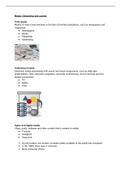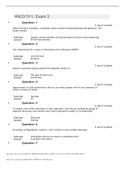Media- Ownership and control
Print media
Means of mass communication in the form of printed publications, such as newspapers and
magazines.
● Newspapers
● Books
● Pamphlets
● Advertising
Audiovisual media
Electronic media possessing both sound and visual components, such as slide tape
presentations, films, television programs, corporate conferencing, church services and live
theatre productions
● TV
● Netflix
● Films
Cyber and digital media
Video, audio, software and other content that is created or edited.
● Youtube
● Instagram
● Snap chat
➔ On the surface, the number of media outlets available to the public has increased
➔ In the 1980s there were 4 channels
➔ More consumer choice
,Infrastructure- an economic base that shapes society
Superstructure- Ideological base that shapes society
Marxism and the media
● Ruling class own and control media have a vested interest to portray capitalism in a
positive light.
● Workers never aware of exploitation (false class consciousness)
● Legitimise capitalism
● This reinforces their position
Traditional Marxist
● Owners of the media control content
● Made their money in the capitalist system
● Media can be censored by media owners
Marxism and the media- critics
● It ignores many rules and regulations that restrict the power of the media, such as UK
official secrets act and libel laws.
● Size and complexity of media organisations means direct control is impossible
● Substantial evidence of media manipulation and assertion by Rupert Murdoch (2007)
that he controls the political line in the sun and the News of the world but not the
Times and Sunday Times.
Neo-Marxist
● Marxists who have developed and adapted Marxist theory with times
● Media helps put across ideology that is values beliefs and information that support
capitalism but this is not the primary result of actions taken by media owners-
Contrasts traditional Marxists
, ● Althusser argues the mass media is part of the ideological state apparatus (ISA) (a
collection of institutions that transmit ideology that supports the existing social
arrangements)
● Along with education, the family and religion, media puts across an overwhelmingly
pro-capitalist message- eventually to be seen as common sense
● They use the term legitimisation (making the system just and fair) to describe the
process by which ideology of the ruling class is made to seem fair and legitimate.
● They accept there are other views expressed in capitalist societies and there is even
resistance to this ideology-
● Through their overwhelming dominance of ISA and control of the
repressive state apparatus (RSA) so the police, army, etc.
● The ruling class able to dominate and control the rest of society
● Neo-Marxists call this process of dominance hegemony (the ideological
control that the ruling class have over the masses
Ralph Milliband
● Argues although a variety of views are expressed through the media, the majority
come from a limited moderate spectrum that supports the system
● Media labels radical, critical views and the people who express these as extremists
and abnormal. Looney left- a common term of abuse
● 1980’s the sun ran a series of these stories, for example, a London council was
accused of banning baa baa black sheep because it was racist when the school was
run by parents
● Views outside this normal spectrum are labelled extreme, even dangerous
Glasgow university media group (GUMG)
● Use content analysis to investigate political bias in the news media.
● Controllers of the media set the agenda- determine what topics should be published.
● Gatekeepers, editors and managers who decide what we published- their decisions
are as informed by policies and principles (ideology) laid down by others.
● As neo-Marxists point out, these new professionals come from similar backgrounds
and viewpoints- no conflict between owners and professionals.- no challenge to
status quo
● Public broadcasting, a position not different. Government appoints establishment
figures to the BBC trust, people who support the system and are from a higher class.
The BBC is also increasingly subject to commercial pressures and is indirectly
influenced by advertising.
Pluralist view of the media
● Different parts of media cater to different sections of society
● The media reflects society. There is diversity within society which is reflected in the
diversity of the media
● Because the media reflects society, they are unlikely to have much effect on
changing society.
● Owners do not have direct control over the media.
, ● They can influence what is presented in the media, but they cannot directly control
what is produced for a variety of reasons such as audience taste, legal requirements,
dominant news stories etc.
● No single dominant class, but a wide range of competing groups in society with
different interests. These different interests are reflected in a wide range of media,
covering all points of view
● The media represents and caters for all parts of society. No social group excluded
from the media, each group is catered for.
● Media content is driven not by a dominant ideology or the interests of owners, but by
the circulation and audience figures in search for profit.
● Media will serve what is requested by the audience to boost their profits and market
share.
● Mass media are generally free of any government or direct owner control and can
present whatever view they want- contrasts Marxists
● The power lies with the audience and not the media, as the audience has a reason to
choose a ‘pick’n’ mix’ approach to whatever interpretation suits them.
● Media managers control the media who allow a great deal of freedom. They are more
concerned with maintaining and developing their audience figures and profit. -
audience in power
● Journalists write stories using ‘news values’ which reflect the wishes and interests
most relevant to their audiences.
● Journalists therefore just provide the audiences what they want- bias reflects what
the audience wants and they have the power to accept, reject and ignore the content.
Personal influence-
● 1955 Elihu Katz and Paul Lazarfeld
● ‘Fundamentally all communications research aims at the study of effect but there are
a variety of possible effects that the mass media may have on society, and several
different dimensions may be classified
● In general, the mass media has a relatively limited influence.
Mass communication can be affected unpredictably by-
❖ Variable exposure
❖ Access or attention to media messages
❖ Personal, practical, political or technological factors can shape the nature and extent
of individuals or groups exposure to any particular message or medium
The type of media used to convey the message has an important impact on the power of the
message. For example tv footage of starving children than a newspaper report about the
same subject.
The nature of the content and the form, presentation and language will have important
consequences for its effect.
Beliefs and attitudes among members of an audience can modify or completely distort the
means of a given message- For example, a prejudiced person would refuse to read about
BLM as it is not correlating with their belief.





